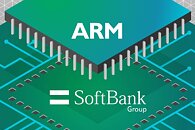Tuesday, August 4th 2020

Arm Co-Founder Doesn't Think NVIDIA Owning the Company Would be in Its Best Interests
Arm co-founder Hermann Hauser recently gave an interview to BBC where he expressed some concerns regarding the prospective buy acquisition from NVIDIA, which has been in talks with Arm owner Softbank towards the IP-designer's acquisition. As Hauser puts it, "It's one of the fundamental assumptions of the ARM business model that it can sell to everybody," Hauser told BCC, "The one saving grace about Softbank was that it wasn't a chip company, and retained ARM neutrality. If it becomes part of Nvidia, most of the licensees are competitors of Nvidia, and will of course then look for an alternative to ARM."
Hauser doesn't think the NVIDIA deal will follow through due to these aspects of the chip design ecosystem, with many Arm clients - such as Intel, Apple, Qualcomm, TSMC, Samsung, among others - being direct or otherwise indirect competitors to NVIDIA. Hauser thinks that Arm would be much better served through a British government intervention in bringing the company back towards the British fold: "The great opportunity that the cash needs of Softbank presents is to bring ARM back home and take it public, with the support of the British government." The Softbank acquisition occurred back in 2016 and cost the company some $24 billion; however, recent estimates from New Street Research LLP placed Arm's valuation at USD $44 billion if its IPO took off in 2021, and as much as $68 billion by 2025.
Source:
BBC
Hauser doesn't think the NVIDIA deal will follow through due to these aspects of the chip design ecosystem, with many Arm clients - such as Intel, Apple, Qualcomm, TSMC, Samsung, among others - being direct or otherwise indirect competitors to NVIDIA. Hauser thinks that Arm would be much better served through a British government intervention in bringing the company back towards the British fold: "The great opportunity that the cash needs of Softbank presents is to bring ARM back home and take it public, with the support of the British government." The Softbank acquisition occurred back in 2016 and cost the company some $24 billion; however, recent estimates from New Street Research LLP placed Arm's valuation at USD $44 billion if its IPO took off in 2021, and as much as $68 billion by 2025.


33 Comments on Arm Co-Founder Doesn't Think NVIDIA Owning the Company Would be in Its Best Interests
Arm is not in any way at all anywhere close to consoles.
They're set in stone, arm have an awful lot of core's with differentiation, plus a very configurable GPU from 2/16 cores and a vast amount of accelerator's that are completely optional.
Apple's arm does not equal Qualcomms or Samsung and there are many , many more arm chip suppliers with different ideas too.
X86 has fewer side options cos it's just better at general.
Arm chips being low power get to play on new node's first an artificial advantage that doesn't sit well with attaining HP performance out of those, simple.
And your making a lot of assumptions regarding use cases, genuinely arm cannot do what I want on three of the four computers I have to use, only my backup/file server Could happily use arm.
So no thanks dualy x86 with HT is too slow arms not even capable of running these software.
Oh and who buys a computer solely with the few tasks they have in mind, most exceed that due to the intelligent ideology that they may do more and that they might need something unexpected to work , the lack of cd/dvd drives for example has probably annoyed everyone who works with PC's at some point.
But the point of the similarity between ARM chips and consoles was about how people go about developing for these things. You have to account for the very special nature of a console being specialized for games, just like you would have to account for a more specialized nature of an ARM designer chip that works best for a certain number of applications but can also simulate all kinds of other applications like Apple is doing with Rosetta 2.
And the meta point is that people, and therefore also companies, will go for that, just economically, because they can reduce the cost of the chips and at the same time improve the performance and efficiency on certain key tasks. It's kind of a no-brainer. We're at performance levels with CPUs that already exceed what we need most of the time. But what we're still lacking in right now (and always will be) is efficiency at scale and prices. Prices that should be going down for these things, but are actually climbing the whole time in the last years. For an absolute commodity like a computer these days, that's kinda unprecedented. Commodities should usually get lower and lower in price as time goes by. This is where ARM will shine the most. So we could be seeing a major shift to ARM if just the price is lower, which we already know it definitely is.
And that plus Media consumption and communication are arm's mainstay.
So accelerator development here by arm and apple and intel have vastly paid off, simple but arm are not alone, AMD have some but access to all of it anyway as does intel tbf.
What I meant by a process advantage is this.
Apple and Qualcomm use the cutting edge At risk(might not get many working) production node's at foundries (Tsmc) (5nm At the minute but 3nm soon) , the other slight setback is that the process to make those chips is being actively developed to scale it up.
Small chips work well for this since the size helps keep low yields to output useful amounts of chip's.
They're designed and manufactured for very low power use, not speed and performance.
The improvement developed goes into the creation of a high power version of that node, which also enjoys a quicker , streamlined ramp to full production runs.
Sooo, a cutting edge non server, arm design is actually held back in performance due to node's, though it gets it's already efficient ass massaged by the same thing.
It gain's the maximum efficiency from a node with the maximum performance always blocked to it.
And time and again single threads at speed have rained supreme , thing's are changing but not the way the chips are made. Well not introduction ideology.
As for useable.
My arm phone does all the usual very well but nothing like the work , actual work of any other.
And the one pc I have to do actual work on is not upto the minor tasks I require if it.
I'm only talking looking at technical drawings here too no simulation running, my home pc does that.
There's a million different uses for a billion different computing devices so to assume we're all doing what you think is wrong, sure a statistical and factual number of people are surfing now but I also do so much more than that with them, a lot do.
The thing is also that Intel is falling quickly and AMD might not be actually the one taking its place in the long run. It could actually be ARM that might take the most advantage from Intel's downfall.
Arm chips only appear as good as they do because of a vast array of coprocessors ,and accelerator's.
The raw core's are just too weak but perspective is key.
And like I said 30% of arm's efficiency comes from the node at 5nm , they're not at all out of reach of x86 in terms of innovation or progress, even Intel aren't as off the ball as your implying.
Look at this video from 2018
Look at the whole thing, he does a benchmark.
After the video tell me how the "raw cores are just too weak" when he is comparing it core for core two years ago? And the price is lower on ARM without massive scale like Intel, so how? Do you really think that it can't happen on the PC side as well? ARM was just too busy taking the mobile market for themselves these last years. It seems like now they have the time and money to show what they can really do in the PC market.
Tech is already consolidated enough, this is just more ridicolousness ontop of it. And hopefully it goes all to UK, so you have more diveristy, I'm sick of the reliance on Eastern Asian hardware, badly translated BIOS screens and customer feedback not really being respected well.